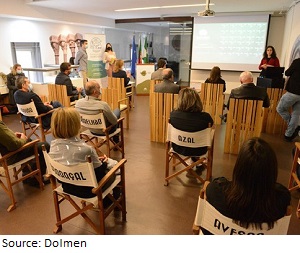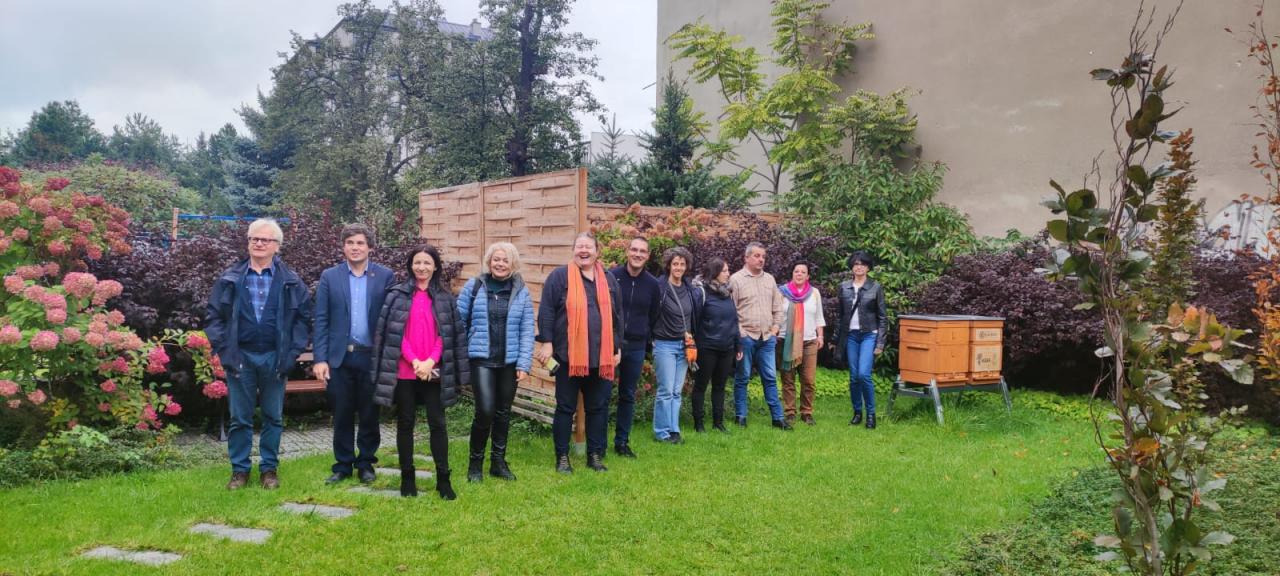
The Municipality of Amarante, one of the most beautiful and “sweet” cities of Portugal, is a destination in the north of the country. It is recognized for its honey in varieties such as heather, rosemary, eucalyptus or orange that is so special, that it is labelled with the EU Protected geographical indication. Originating from traditional use of honey in the culinary field and due to locals with dreams and visions, who joined small beekeepers and developed their business, local honey and diverse products made with honey or other bee products are distributed across the country and abroad. Today, beekeeping is a growing sector of the local industry especially important for the rural areas.
Honey bread – in Portuguese Broa de mel is a Portuguese musical duet that became famous in the 80s and 90s with their love songs performed in several festivals such as the Festival RTP da Canção. Their songs talked about passion, ardour, union, romance, breezes, caresses and about “honeymoons”. These sweet themes which refer to happiness and wellbeing can make us feel honey.
The name of the group as well as their song lyrics are deeply connected with “broa de mel” a well-known Portuguese sweet made in many bakeries and pastry. Honey is commonly used in Portuguese confectionary in typical sweets such as “ginger and honey cake”, “honey and cinnamon cake”, “honey bread with egg cream filling”, “cake of olive oil and honey with cinnamon and nuts"," Algarvian honey cake "," honey and yogurt cake" and "honey and raisin cake" or "honey toast".
Honey has countless uses; from gastronomy to cosmetics, health and wellness…. or as a unique product. Increased demand for such products plays an important role in the local economy, as recognized by Alexandre Vieira, current president of Apimarão (Association of Beekeepers of Marão and Aboboreira), an association that brings together about 50 beekeepers. He is committed to making Apimarão more dynamic and through the association create logistical conditions that facilitate the work of honey producers, whether in terms of extraction or commercialization.
A forest engineer, and also a beekeeper himself, Alexandre Vieira sells pollen to tearooms, pastry shops or pharmacies but above all he is committed to the design and building of beehives. He produces apiaries regardless of size even small ones meant for self-consumption.
The mountains of Marão and Aboboreira and the slopes of the river Ovelha have flora of heather, rosemary, eucalyptus and orange blossoms. Honey produced there is a very special EU food product which has the EU label “Protected geographical indication (PGI)”.
In Amarante there are several others inspiring stories related to honey. There is a story of Alexandre Morais who today owns 200 hives and export products abroad, but it all started with a swarm entering his house. The successes story of the Dolmen store (Cooperative for Local and Regional Development); Tiago Morais, a professional firefighter and professed admirer of Nordic cultures that fulfilled his great passion for mead “the drink of the Gods” by producing it (Runas Hidromel). And nevertheless Inside Experiences, a local tour operator, who created two routes / tours to provide tourists with the honey experience.
Summarised from article by Nicolau Ribeiro (Municipality of Amarante)
Knowledge hub: Education
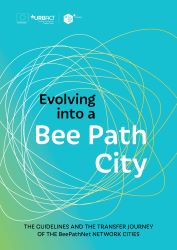
For a start we invite you to read a “pocket” version of guidelines with inspiring stories from 10 EU cities. It will be available in 12 EU languages by the beginning of December 2022. Though, to start a movement in your city, we recommend to deep-dive in full guidelines and tools described below.
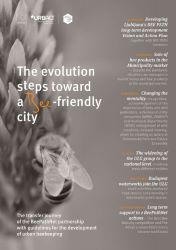 Guidelines: The evolution steps toward a Bee friendly city - The transfer journey. Find out more how to develop bee products and incorporate them into the Bee Path. In the BeePathNet partnership there were several ways how to achieve this and they are described in the guidelines for the development of urban beekeeping.
Guidelines: The evolution steps toward a Bee friendly city - The transfer journey. Find out more how to develop bee products and incorporate them into the Bee Path. In the BeePathNet partnership there were several ways how to achieve this and they are described in the guidelines for the development of urban beekeeping.
Read chapter 8 Bee Products – The development of bee products in the Bee Path. There you will find how Ljubljana did it and some of its success stories such as Rent-a-beehive.si, Special house honey dessert of the restaurant Pri Kolovratu, cooperation with the Slovene Ethnographic Museum….
There are also cases studies from all BeePathNet partner cities Cesena (Italy), Bydgoszcz (Poland), Hegyvidek (Hungary), Nea Propontida (Greece) and Amarante (Portugal).
BeePathNet newsletters library - visit the thematic newsletters archive and find inspiring urban stories, ideas for small scale activities with a big impact, involvement of different stakeholders etc… To get closer to citizens, we translated them in several languages.
For more info visit our BeePathNet Reloaded webpage and follow us on Facebook or Twitter.
Some good practices for inspiration
Just for a first inspiration, we present some of our Bee-friendly cities good practices.
BeePathNet Reloaded partner – the city of Sosnowiec, Poland
Sosnowiec the city where everybody is part of awareness raising
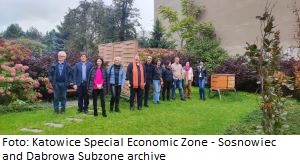
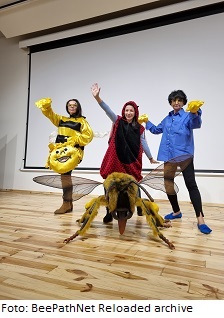 In Sosnowiec the city administration has succeeded in attracting the interest of various institutions and citizens who all work together in raising awareness about bees and why we need to change our attitudes and way of thinking to provide a brighter future for all of us.
In Sosnowiec the city administration has succeeded in attracting the interest of various institutions and citizens who all work together in raising awareness about bees and why we need to change our attitudes and way of thinking to provide a brighter future for all of us.
The institutions that have managed to incorporate the care for bees into their work can be found in many fields of work in Sosnowiec. Let us mention just a few of them: Zagłębie Media Library, Honey Comb Charity Shop, Museum of Medicine and Pharmacy, Sielecki Castle and many more. Even the Katowice Special Economic Zone has joined in the buzz and is sharing and spreading knowledge.
BeePathNet lead partner – the city of Ljubljana, Slovenia
Rent-a-beehive.si / Najemi panj.si
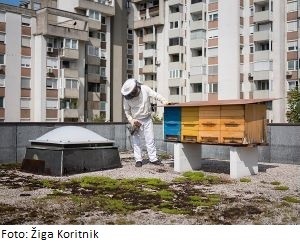
Urban beekeeper Gorazd Trušnovec gained entrepreneurial education through the Entrepreneurship Training Programme organized by the City of Ljubljana and the Cene Štupar Educational Centre, where he developed a special product called “Rent-a-beehive”. The rent-a-beehive service is usually based on a one-year agreement, where customers can rent two or more beehives. For an annual rent, a client gets 10 large glasses of honey per hive, with the option of buying up all the remaining honey, and he/she can attend to all the beekeeping tasks with beekeepers explaining the individual operations. There are also mentoring packages, team-buildings for companies, workshops for children … Lately he started with a bee-keeping course as a rehabilitation program for prisoners.
BeePathNet partner – the city of Amarante, Portugal
Dolmen
Dolmen is the name of a co-operative for local development located in Amarante, Portugal. It includes members from different sectors – from the public sector (like the Municipality of Amarante), other associations, SMEs, producers and individuals.
The mission of Dolmen is to promote local development through the valorization of local products, culture, heritage and people. Its operation focus is on rural areas, not only from Amarante, but also from other neighbour municipalities, such as Baião, Cinfães, Marco de Canaveses, Penafiel and Resende. Crucial to their business development is participation at national fairs, the fair of the hypermarket Continente and fairs abroad.

